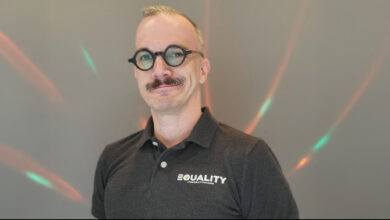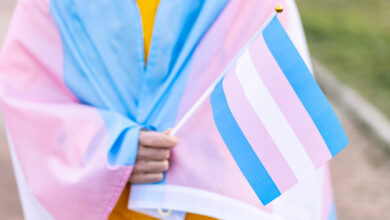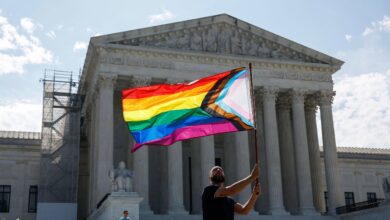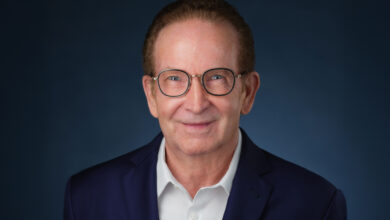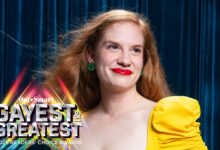
OutSmart’s Leading Ladies of 2016
Celebrating the accomplishments of Houston’s top LGBTQ women leaders.
By Megan Smith
As Beyoncé entered the Super Bowl stadium during last month’s halftime show, seven words reverberated throughout the arena and at Super Bowl parties worldwide: Okay ladies, now let’s get in formation. Though controversy regarding her performance ensued, the self-described feminist and pop diva’s message is simple: when we band together, women can make powerful change happen. We are fierce leaders, and we won’t back down from a fight.
This concept isn’t new to the LGBTQ women of Houston. These women have worked for years on every level—in activism, philanthropy, business, politics, and more—to ensure that equality is achieved on all fronts. To honor Women’s History Month in March, OutSmart reached out to the community for nominations of LGBTQ women leaders making an exceptional difference in Houston. Below our nominees discuss their current work and future plans for the LGBT community, as well as divulge the past decade they’d like to visit.
Ali Lozano

While Houstonian Ali Lozano was a college student in Washington DC, she met a group of LGBTQ activists outside of the White House—activists who would change her life. “I became friends with those activists and became a member of their group, GetEQUAL, which is now a very influential player in the fight for social justice on all fronts,” she explains. “While in GetEQUAL, I worked on the repeal of Don’t Ask, Don’t Tell and the fights to pass marriage equality and the Employment Non-Discrimination Act. I’ve been organizing and working as an activist ever since.” Lozano, who is an out lesbian, currently serves as the outreach and field coordinator for the Texas Freedom Network, where she collaborates with college students and other young people on voting rights, reproductive justice, and LGBTQ equality through public policy and community organizing. Prior to her current job, she worked as the political manager for the Gay & Lesbian Victory Fund, helping to elect viable, pro-choice, openly-LGBT candidates to public office. During her time with the Victory Fund, Lozano saw former mayor Annise Parker win her re-election, and council members Mike Laster and Robert Gallegos get elected to office. Lozano was also recently elected to the board of the Houston GLBT Political Caucus, the South’s oldest civil-rights organization dedicated solely to the advancement of LGBT equality. When asked what decade she would like to live in, Lozano’s answer was, not surprisingly, political. “I was born in the ’90s, so if I could, I would live in the ’80s so that I could watch Ann Richards give the 1988 Democratic Convention keynote. Cecile Richards, Ann’s daughter and the president of Planned Parenthood, is the founder of the Texas Freedom Network where I work. That’s what I’d call a full Texas circle!”
Reagan White

Reagan White wouldn’t choose to live in any other decade—this self-described “beautifully made” black transgender woman is happy simply being the authentic self she is today. White began attending a weekly transgender support group after coming out a little over a year ago. Thanks to mentors Ian Snyder and Dana Louise, White has not only found peace in her transition, but has become an advocate for other transgender community members. “My goal is to pass that encouraging power on to at least one person,” she says. “Because if I can change that one life, that person could go on and change the world.” When asked which issue she feels is most important to the community, White responds with not one, but seven. She calls them the seven E’s—education, employment, economic development, entrepreneurship, endowment, encouragement, and enterprise. White advocates for these issues, and also spreads support through her “daily thought” postings on social media—small words of encouragement to her transgender brothers and sisters. “I started a few months ago, and I’ve gotten so much positive feedback and have been asked to continue,” White says. “The goal is to encourage all transgender people to love and embrace life authentically.”
Sandy Bubbert

What keeps Houstonian Sandy Bubbert motivated? “Everyone’s sweet tooth!,” she exclaims. Since 1985, Bubbert has owned and operated The Acadian Bakers, the only lesbian-owned bakery in Houston. She was catering same-sex wedding ceremonies way before the Supreme Court ruled marriage equality to be the law of the land. She even baked the cake for former mayor Annise Parker and Kathy Hubbard’s wedding. “I’m just busy baking my buns off!” Bubbert says. But before she was covered in flour full-time, this longtime OutSmart Gayest & Greatest winner was also involved in numerous LGBT community organizations. She served as vice president of the Log Cabin Republicans of Houston; secretary, vice-president, and board member of the Diana Foundation; a founding board member of the Montrose Center; and a board member of Lesbians Over Age Fifty, among others. Today, she’s an advocate for homeless gay youth, the issue she feels is most important to our community. Bubbert has also been recognized with a plethora of community awards, including five presidential certificates of merit, the 2011 Museum District Business Alliance Community Improvement Award, and six “Best of Houston” awards from Houston Press. And if Bubbert could time travel, she wouldn’t just be a baker, but a baking queen—in the Victorian era, that is. “They knew enough and were just smart enough not to be dangerous!” she laughs.
Kim Frederick

If Kim Frederick could live in a different decade, she’d choose the 1960s. “I would have been on the front lines for civil rights in all aspects,” she says. “There is a certain empowerment you get from fighting your heart out for something you believe in. And on a side note, the music was spectacular!” While she may have missed the first civil rights movement, Frederick is hardly sitting back this time around. As a longtime feminist and out lesbian, she has dedicated her work to ensuring LGBT equality, racial justice, and women’s equality. Frederick founded and co-leads HRC Super Volunteers, a national grassroots network of volunteers to help elect Hillary Clinton as president. She has watched that organization’s membership grow into the thousands and spread across state lines. Fredrick notes that Hillary Clinton was one of her earliest role models, along with Eleanor Roosevelt, Ann Richards, Barbara Jordan, and Shirley Chisholm. “It’s not fair that women make up half the population but are so grossly underrepresented in government,” Frederick says. “It’s not fair that sexism is so pervasive and sometimes so subtle that even women participate in it, perpetuate it, or don’t even know it’s happening. It is so normal, and our society has come to accept this, so we haven’t had the major uprising we need—a critical mass. I wasn’t around for the first women’s movement, but the critical mistake made then was not bringing women of color to the table in leadership roles. We need to find a way to build those bridges and form a strong coalition.” At the very beginning of the Black Lives Matter movement, Frederick marched in one of Chicago’s rallies before returning to Houston to attend several more and promote the movement’s message on social media. On the LGBT advocacy front, Frederick assisted her girlfriend, Melissa Vivanco, in support efforts for the Houston Equal Rights Ordinance, and previously headed her workplace’s LGBT resource group. “It is not fair when an LGBT person can get fired simply for being gay,” Frederick says. “I genuinely care about the world in which I live in, and everyone else that lives on this planet—including future generations. I believe in fairness, equality, and justice.”
Julie Mabry

Houstonian Julie Mabry is in love with her city. “I’ve lived in Beaumont, Albuquerque, Denver, Tucson, San Antonio, and Houston,” Mabry says. “No city has made me feel as warm and fuzzy as Houston.” Mabry, who is an out lesbian, is the owner of Pearl Bar Houston, the city’s only lesbian lounge. “Pearl is a reflection of the pride I have in my community and my city,” she explains. “Lesbians deserve a place to feel safe and sexy. I will always work to maintain this space for my community.” But Pearl Bar isn’t just a great place for lesbians to relax among friends—it’s also a space to build community and support LGBT philanthropic organizations. Last year, Mabry joined Her Destination Unknown’s fundraising team to help raise $28,000 for AIDS Foundation Houston. “Part of my activism in Houston is hosting fundraisers at Pearl,” Mabry explains. “Last year, we were able to raise/donate over $60,000 to our community.” For others who are interested in getting involved, Mabry suggests getting involved with the Human Rights Campaign. “We need boots on the ground to help others learn how their vote matters,” she says. As for what decade she’d like to live in, Mabry says she’s fine right where she is. “I’ve lived to see an openly gay mayor elected in a major city, and witnessed the legalization of nationwide gay marriage. I love the life I’m living! Maybe Hillary will win the presidency and finally come out,” she jokes. “That would be a great addition to the 2010s!”
Alexis Melvin

Alexis Melvin rarely follows the rules. That’s why when asked which decade she’d like to live in, she responds with two answers—the 1920s and the 1960s. On one hand, there’s “flappers, the music, speakeasies, cars with running boards, and equality and sexual freedom just starting to be seen.” Then there was the ’60s, with its “rock and roll, Carnaby Street mod fashion, Compton’s Cafeteria and Stonewall Inn actions, Mary Quant and mini skirts, a major move toward equality in the U.S., the space race, and Dr. Who!” It was also when Melvin, who identifies as a bisexual, gender-fluid transgender person, began to advocate for fairness and equality for the transgender community. “I have a passion for fairness and helping people,” Melvin says. “When I see a situation that is not fair, I have to do something about it. Members of the transgender community are treated unfairly in many ways. This has improved drastically, but we still have much to do.” Melvin currently serves as a board member and treasurer for the Transgender Foundation of America—an organization that she’s been involved with for the past eight years. For the past decade, she’s also been a part of the Houston Transgender Unity Committee, where she is currently chair and treasurer. “There is still significant discrimination for transgender individuals in employment, employment security, healthcare, public accommodations, government services and benefits, education, police protection, personal safety, and many other areas,” Melvin says. “The transgender community has to contend with being left out of many of the LGB equality advances because some equality organizations consider it politically expedient to remove protections for the transgender community from proposed legislation to make it easier to pass. In the recent campaign to repeal the HERO ordinance in Houston, the transgender community was attacked with lies and misstatements that were not challenged by [some pro-HERO groups]. These lies will have to be challenged so that we can regain the acceptance that we had in Houston, and move forward in our quest for equality.”
Rebecca Treviño

Rebecca Treviño’s activist roots run deep. From an early age, her parents taught her that being a part of a community meant giving back to it in any way possible. “They instilled in me to always stand firm in my beliefs and convictions,” the bisexual Texas Southern University social-work student says. “This was strengthened as I began my journey through my social-work education and became woke to various social and economic justice issues.There are far too many injustices in our society. Many of these injustices do the most harm to women—especially black, brown, and trans women. I am a Latina and intersectional feminist. I wear my identity with pride, [and I] stand up for those who are marginalized and oppressed in an effort to build a stronger community.” Treviño previously completed a term with AmeriCorps, served as a volunteer pod leader with Houston Unites, is currently an active member of the Organization of Student Social Workers at TSU, and serves as vice president of The Glass Slipper Foundation, a local nonprofit that works to educate and empower at-risk youth through leadership and prevention programs in an open and inclusive environment. Since November 2015, she has also served on the board of the Houston Stonewall Young Democrats, which helps to elect pro-equality political candidates to public office. “I believe the most important issue in my community right now is increasing civic engagement among young people,” she says. “There is so much untapped power that exists within our community. Millennials are now the largest living generation! Being part of the political process through civic engagement is necessary for creating change. My advice for anyone who wants to get involved is to find out what you’re passionate about in your community, find your inner power, and get to work! Educate yourself on the political process and find out which candidate is going to support you and what is important to you. Become a Volunteer Deputy Voter Registrar, register as many people as you can to vote, and get them to the polls! This is a big election year. And don’t forget that local and state elections are just as important as the presidential elections.” As for which decade Treviño would choose to visit, that would be the 1970s. “I’m all about dancing the night away while rocking big hair and even bigger shoes!”
Lorraine Schroeder

For Lorraine Schroeder, each decade just keeps getting better. “I want to keep moving forward,” she says. Schroeder has been the director of the LGBTQ Resource Center at the University of Houston since the center’s inception in 2010. “Working with young people, I get daily affirmations that the work we do makes a difference,” Schroeder says. “The negative messages that some young people still hear from their families and society have a profound impact on their well-being. It is a great feeling getting to help introduce them to the awesomeness of the LGBTQ community, and making them aware of their own awesomeness.” For the past three years, she has also been a volunteer with AssistHers, helping to provide non-medical assistance to elderly and disabled lesbians. Schroeder, who identifies as a bisexual lesbian (“It may sound crazy, but that is what fits for me,” she says), also hopes to broaden society’s understanding of gender and, in turn, transgender and genderqueer people. “It is an honor and great fun to work alongside of all the wonderful LGBTQ people in Houston,” she says. “We have so many dynamic leaders and advocates in our community, I am just happy to be a part of it.”
Kristina Tutt

Growing up in a small town, Kristina Tutt felt a great deal of shame about being gay. She didn’t have any mentors to look to, and her exposure to LGBT culture was minimal. “In college, I was blessed with an amazing lesbian mentor who introduced me to culture, pride, and the history of our incredible community,” Tutt says. “This helped me overcome my shameful feelings and plant my roots firmly in my lesbian identity. Over the last 15 years, I have learned to love and accept myself for exactly who I am, and I want to give other LGBTQ people the same opportunity.” That’s why Tutt left her full-time job in January 2015 to start Inspirational Outcomes, a business that teaches LGBTQ people how to combat shame and live as their authentic selves. “I am a Certified Daring Way Facilitator, which means that I am trained to facilitate groups based on the research of Dr. Brené Brown,” Tutt explains. “This includes experiencing vulnerability as courage, increasing self-compassion, creating meaningful connections, and developing resilience to shame.” Tutt will host Inspirational Outcomes workshops on March 12 and 13 in Houston, April 9–10 in Austin, and again in Houston on May 21 and 22. “We all say ‘LGBTQ’ as if it’s one five-letter word, but the truth is that we often treat one another as if we’re from different worlds,” Tutt adds. “If we truly want to overcome things like violence, employment discrimination, and youth homelessness, we have to lift one another up in unity instead of tearing each other down, particularly with regards to our trans brothers and sisters. Apart, we are many separate people with different lives and goals and identities, but together we all sit under the same umbrella, just trying to steer clear of the rain.” When asked what decade she’d like to visit, Tutt responds, “Probably the 1960s, because that’s when all the real activism was happening. I would have loved to be a part of the sit-ins and protests and peaceful demonstrations!”
Lynn Schwartzenburg

If Lynn Schwartzenburg could revisit a decade, it would be the early ’80s. “I wasn’t out then,” she says. “I missed the fun, or so I hear.” But since coming out as a lesbian, Schwartzenburg has immersed herself in the LGBTQ community, giving back to a plethora of philanthropic organizations including the Human Rights Campaign, the Pride 5K Fun Run, the Black Tie Dinner, and, most prominently, AssistHers. “One year, I saw AssistHers in the Pride parade and thought, ‘When I retire, I’ll volunteer with them,’” she says. “I soon realized that I didn’t need to wait until retirement, and I joined AssistHers—which led to joining their board of directors. The board members were, in my eyes, strong, successful women, and I wanted to learn from them.” Schwartzenburg has been involved with the organization—in a variety of positions—for nearly 15 years. She currently serves as the president of the group’s board and as vice-president of finance. “My mom taught me that ‘those who can do, must do,’” Schwartzenburg says. “She has been an incredible example of compassion in action by helping people during her nursing career, with friends, and through volunteering.” Along with her wife, Linda, and their late dogs, Boudreau and Thibodeau, Schwartzenburg also spent several years as a volunteer with Caring Critters, a group of volunteers and their pets participating in animal-assisted therapy activities. “Boux and Thib were beloved visitors to all the patients and clients who got to spend time with them,” she says. “After Thibodeau died of complications from bone cancer, it wasn’t the same, and Boudreau retired from service and enjoyed his remaining year being king of the house.” Moving forward, Schwartzenburg says she is always looking for ways to make organizations run more efficiently, as well as to recruit others with those skills. “I am a computer nerd who loves planning, Excel, databases, reports, charts, and graphs,” she says. “Organizations need people with those skills, and we are hard to find because we don’t always come forward.” For those looking to get more involved, Schwartzenburg advises, “Follow photographer Dalton DeHart around for a while until you find a group that speaks to you. [Laughs] Don’t think that you have to be the loudest voice in the room to be heard or make an impact. Helping out in your own little way helps the whole community. I’m proof that the little way works.”



